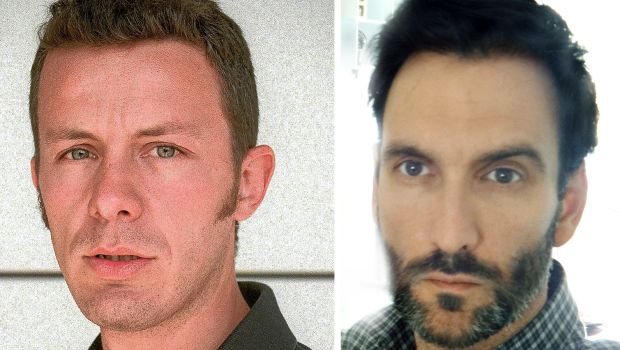
A combo shows an undated file picture obtained on February 29, 2012, of El Mundo daily newspaper correspondent Javier Espinosa (L) and a family handout image dated August 9, 2011, of Spanish freelance photographer Ricardo Garcia Vilanova, distributed on December 10, 2013, in Beirut. (AFP PHOTO/EL MUNDO/FAMILY HANDOUT)
London, Asharq Al-Awsat—Spanish newspaper El Mundo reported on Tuesday that one of its journalists, Javier Espinosa Robles, and freelance photographer Ricardo García Vilanova had been kidnapped by members of the Islamic State of Iraq and Syria (ISIS) on September 16.
The Spanish journalists were kidnapped at a checkpoint in Tal Abyad, Raqqa Governorate—an area known to be under ISIS control—as they were planning to leave Syria, following two weeks of reporting.
Traveling with members of the Free Syrian Army (FSA), which is fighting the regime of Syrian President Bashar Al-Assad, the two journalists were near the Turkish border when they were kidnapped along with four FSA fighters.
Those FSA fighters were released after 12 days.
At press conferences held in Beirut and Madrid by family members and colleagues of 49-year-old Espinosa and 42-year-old Vilanova, it was further revealed that the decision to announce that they had been kidnapped was fueled by a stalemate in negotiations with the Islamist group.
“We have reached an impasse with the captors after many weeks of attempted mediation,” commented Espinosa’s wife, Monica Prieto, also a journalist, in Beirut.
The families of the two men also appealed for the release of the journalists at the press conferences.
“Today we appeal to the Syrian people and all armed groups to help release Javier and Ricardo, who have always been committed to showing the human face and suffering of the Syrian people during these very difficult times,” said Preito.
The kidnapped journalists have been covering the Syrian crisis since 2011, and have traveled into the war-torn country a number of times.
Espinosa was trapped once before in the conflict, in the Bab Amr district of Homs in 2012, after he survived the fatal shelling of the district’s media center that killed French journalist Remi Ochlik and Sunday Times journalist Marie Colvin on February 22, 2012. He was able to flee to Lebanon after a few days.
France-based Reporters Without Borders (RSF) have condemned the abductions and called on the international community to “quickly intervene to prevent ISIS from extending its hold.”
ISIS is the most recent militant group to be added to the RSF’s “Predators” of press freedom list. The list, which “consists of presidents, politicians, religious leaders, militias and criminal organizations that censor, imprison, kidnap, torture and kill journalists and other news providers,” also includes Bashar Al-Assad’s forces and the Al-Nusra Front.
The RSF labels Syria as “the world’s most dangerous country for journalists,” according a report published by the organization on November 6, 2013.
The organization believes that there are currently 18 foreign journalists detained, kidnapped or missing in Syria.
Journalists in Syria have been treated with hostility, suspicion and violence from some sides since the start of the crisis in 2011. RSF statistics reveal that since the beginning of domestic protests in March 2011, 118 journalists have been killed, including both foreign and Syrian journalists.
While Assad’s forces continue to be identified as the main perpetrators of violence against journalists, other groups, such as the ISIS and the Al-Nusra Front, have increasingly shown similar behavior.
Without public statements to identify the motives behind the growing number of killings and kidnappings, the RSF’s November report quotes French journalist Marine Olivesi describing one plausible theory: “In Libya, journalists were regarded as allies of the people . . . I was welcomed with open arms and shouts of ‘Sarkozy!’ That made things quite easy. Because of the lack of change and the inaction of the international community in Syria, there is incomprehension, mistrust and even aggression towards journalists.”
